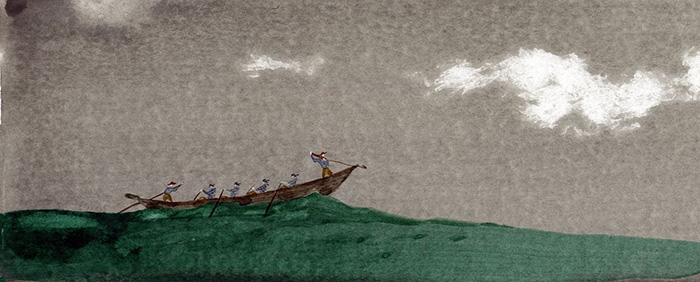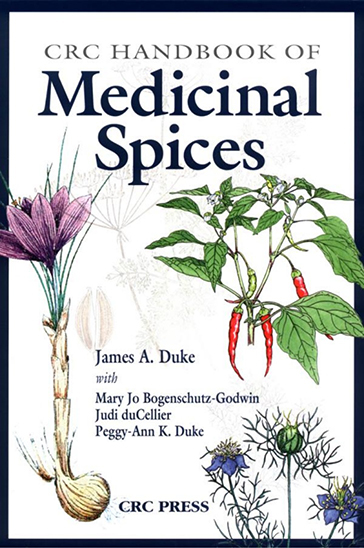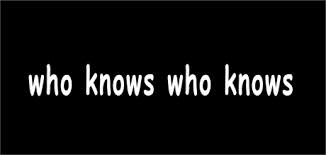LETTERS FROM THE GLOBAL PROVINCE
Knowing the Unknowable, Global Province Letter, 15 October 2014
"It is good to love the unknown."— Charles Lamb
"No one ever approaches perfection except by stealth,
and unknown to themselves"— William Hazlitt
Unknowable. The unknowable has been in the catbird seat, as far as philosophy goes, in modern times. Assorted Germanic philosophers, helped along by the invention of Freud’s unconscious in Vienna, Kant’s categorical reasoning in Germany, and the dissolution of Eastern Europe brought on by World War II, have done a stupendous job of showing us all we do not know.

(watercolor ©2010 Steve Burnett)
Knowing-about-the-unknown already had gotten a pretty good start in the 19th century. We can read amusingly about Schopenhauer’s conclusion that we know just about nothing about ourselves:
The Unknown One day the German philosopher Arthur Schopenhauer (1788-1860) was walking along a street in Dresden, deeply pondering the question of identity. Passing by a garden, he decided to sit and look at the flowers. The owner was suspicious and called the police. A policeman arrived and asked him, "Who are you?" Schopenhauer paused and said, "If you can help me find the answer to that question, I will be eternally grateful to you."
Your name is not you: when you were born you had no name. Your address is not you, because when you move away you are still you. Neither is your phone number you, or your email address, or your Facebook address. When we ask ourselves, "Who am I?" we usually recite our past; but that is the answer to a different question, "Who was I?" But who am I now? The ancient ‘Know thyself’ is an impossible instruction. But that is exactly why it is given: it is to bring you to the unknown.
"I saw most surely that it is quicker and easier for us to know God than it is to know our own soul." So wrote the 14th-century anchoress Julian of Norwich, the greatest of the English mystics. Meister Eckhart, in the same century, said, "There is nothing so unknown to the soul as herself."
NeoPlatonic Times Again. This addiction to the unknowable in modern thought has set the stage nicely for the present era. Philosophy today is a stew of ideas and semi logic and mysticism and ideology masquerading as thought. Thinking is a mishmash of muddled pronouncements that leaves us confused and indecisive. It does not matter whether we are talking about the situation in the Middle East, or global warming, or Alzheimer’s, or our sugar-filled diet, or what makes the stalled economy tick, the experts say much meaning little and we consumers are unsure what to do about everything.
It’s not that Wall Street money managers are failing to offer grand opinions about how we will make millions doing this or that, but that they are proven wrong in short order, usually in less than a year. The financial markets are sliding now, belatedly reflecting a stagnant world economy, but only yesterday we were told the sky’s the limit. It’s not that climate doom people don’t see hotspots hither and thither, but that the data on warming is mixed, and we may even here and there see signs of an imminent ice age around the corner. It’s not that policy makers and health experts don’t have a potful of recommendations for making us stand tall and lose weight, but meanwhile our health and our waistlines continue to decline. Our thinking and resulting actions are simply a hesitant bunch of ‘maybes.” Reactionaries who want to make the present into a collection of yesterdays are riding high in this vacuum.

If you have a sense of humor, you must admit that it is all confusing, no matter your field, no matter your conviction. For instance, our good friend Jim Duke, one of a mere handful of experts on the medicinal use of plants in the world, sort of thinks a salad of special greens will ward off the flu, and never takes a flu shot. On 19 September he showed us a draft of "Fleeing the Flu and the FDA." Duke proclaims, "For the record, I firmly believe the CDC or FDA should scientifically check out my Antiflu Chutney. It is made from diced edible natural garlic, ginger, mustard, onion, and turmeric, topped with a dash of edible antiviral spices, e.g. Duke's Dozen antivirals (e.g. bay, black cumin, caper, capsicum. cinnamon, citrus peel, coriander, horseradish, hyssop, oregano, rosemary, thyme). The evidence I have been reviewing from U.S. Govt. literature (PubMed) suggests that these will prevent as many flu cases as the government-backed and pushed questionable unnatural vaccines. And if you want to strengthen your flu prevention, gnosh on raw garlic!"
There is incidentally a wide and very valid debate, even amongst levelheaded people, about the merits of immunization that we shall not belabor here. But there are reasons why we are confused about what to do about preventing flu and pneumonia that go well beyond the philosophical divide over immunization. Fact is that the state of the art is evolving so fast that the doctors are not keeping up on preventive options and the clinics do not have enough of what you need in their larders. For better or worse, flu and pneumonia shots are changing fast. To catch up on what’s happening (and you had better because your doctor has not), we suggest you read "New Vaccines Aim to Help Fall Flu Fight" and "New Advice for Vaccines to Stave Off Pneumonia." They will set you to thinking. Based on the alternatives revealed here, many are taking different cocktails. For the flu many are taking the quadrivalent shot instead of the standard trivalent shot. Those over 65 are taking the so-called Fluzone High-Dose Vaccine to get a stronger protective boost. And for pneumonia, people over 65 are urged to take two vaccines. Traditionally oldsters and others took Pneumovac 23. Now seniors are prompted to get Prevnar 13 as well, if they can find it. Both work against the bacterium Streptococcus pneumonia. Those who took their 23 shot more than 5 years ago are urged to get a booster, to be administered 6 months to a year after taking the 13. Many healthcare providers simply do not know about the new Prevnar 13. Dealing with Chronic Conditions. With pneumonia, or flu, or old age, or Middle East internecine warfare, or obesity, or an overblown financial industry that is consuming too much of our wealth, or the stripping of our earth’s organic cover, we are dealing with problems that don’t quite go away but linger a long while or hang around forever. We are unprepared for the chronic in our economy, in our healthcare, or in our affairs of state. Our stockbroker pontificates about strategy but then talks about making a killing in the next 12 months. Our doctor talks prevention and balanced living but then dispenses the antibiotic of the moment. They talk long but go short. So we have to ask ourselves what we do and what do we think when there are no clear answers. The way to deal with the unknowable is not to. Better yet the best course is to do something that we can believe will do a whole lot of good sometime in the farflung future. It’s wise to crank up long term solutions when tactical approaches to the short term may avail us nothing (or worse). In healthcare, in politics, in our economy, we don’t know how to fix today. The best thing for it is to work on tomorrow, the further out the better, because we have a chance of doing something effective about the future. What are the moves we can make now that won’t, don’t do a lot for tomorrow but could conceivably do a whole lot for 2020? P.S. A Dallas CEO we advised for several years owned up to his reluctance to use consultants. He said they were all right once upon a time, but that “they had fallen behind the facts on the ground and did not have a sense of what was happening in the marketplace.” Experts in many fields are not current and so they offer flawed advice. Many, many of us are running in place and not keeping up. P.P.S. The famed Ludwig Wittgenstein, from a rich Austrian family, himself symbolizes the philosophical dilemma. After a bout of depression he gave all his money away to his brothers and sisters. Depression and suicide abounded in his family. To some extent he believed that philosophical problems dissolved when we got our language straight. The humorous might say that he solved problems by saying they did not really exist. But he achieved quite an eminence at Cambridge and throughout the philosophic world. We might be inclined to say that the philosopher king of the 20th century put philosophy into a blind alley where it could no longer usefully serve mankind. 
Home - About This Site - Contact Us
Copyright 2014 GlobalProvince.com